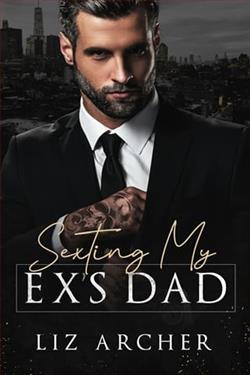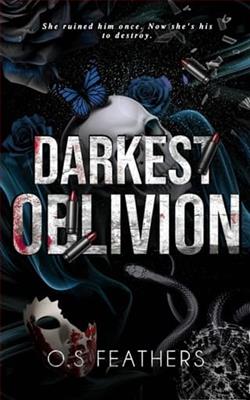Page 8 of Forced Virgin Bride of the Bratva
But I do.
“Mr. Sharov?” she says, voice low and careful.
Something in me shifts. It’s the way she says it. Not with awe. Not with challenge. Just… quiet recognition. Like she’s naming something she’s been told to fear, but can’t quite believe in.
I nod once, a sharp flick of the chin, then gesture toward the chair across from her. She’s already sitting, but she straightens, adjusts. Obeys.
She moves like she’s been practicing all day.
I lower myself into the seat opposite her, letting the silence stretch. She doesn’t fidget. Doesn’t speak again. That surprises me. Most girls in her position—used to leverage, to family power—they fill silences. Try to charm their way out of discomfort.
Kiera doesn’t; she simply watches.
Too sweet. Too unsure. She doesn’t belong in a room like this. Doesn’t belong in a negotiation where her body is the price and I’m the buyer with blood on my hands.
I lean back in my chair, one arm draped along the side, watching her. “How does it feel,” I ask, “being offered to your father’s killer?”
Her shoulders tense. Not a flinch, not quite, but it’s obvious nonetheless.
Her mouth presses into a line, tight and tense. Then her eyes meet mine again, and for the first time, there’s something sharp in them.
“Maybe my brother doesn’t like me very much.”
The answer lands harder than I expect. That cuts deeper than it should.
I study her in a new way. Not as a liability, and not as a symbol of Tiago’s weakness.
She has shadows. I can see them now. Beneath the quiet, beneath the practiced sweetness, there’s a fracture line waiting to split.
I lift the glass but don’t drink. The vodka’s already warmed from my hand, and it doesn’t promise anything I need. Still, I take a sip—more for the act than the taste.
Her voice stays with me.“Maybe my brother doesn’t like me very much.”
It should’ve landed like sarcasm or a brat’s sulk. It didn’t.
I let the silence stretch between us, watching how she wears it. She doesn’t squirm, doesn’t try to fill the space with nervous chatter. She waits. Carefully composed. Still folded into herself like a question without an answer.
I tilt my head. “Do you hate me?” I ask.
It’s not a provocation; I want to know. I’m used to fear, to admiration laced with caution. Hate, when it comes, is usually louder.
She lowers her gaze, lashes brushing against her cheeks. When she looks back up, the honesty is sharp enough to register.
“I didn’t know him,” she says. “My father.” There’s a pause. “He sent money. Christmas cards with nothing written inside. I had dresses, tutors, a school that wasn’t in ourneighborhood, but he never came to any parent meetings. I don’t think he ever asked about them.”
Her hands are still in her lap, but she shifts her weight slightly, steadier now. There’s a rhythm forming, one that belongs to her and not the performance they dressed her in.
“I don’t mourn him,” she adds. “Still, I don’t want this either.” Then, without flinching, she adds, “I don’t like you, but I don’t have a choice.”
That last line should sound childish, like a tantrum held in check. It doesn’t. It lands clean and level, unafraid.
Something shifts. Not in her—she’s already settled—but in how I see her.
The silk, the quiet posture, the careful answers—they’re not submission. They’re calculation. She knows where she’s been placed. She knows what they expect.
She’s playing the part. I wonder if she even realizes how much of that fire shows when she speaks plainly. When she stops performing and starts telling the truth.
That line keeps ringing in my ears.“I don’t have a choice.”















